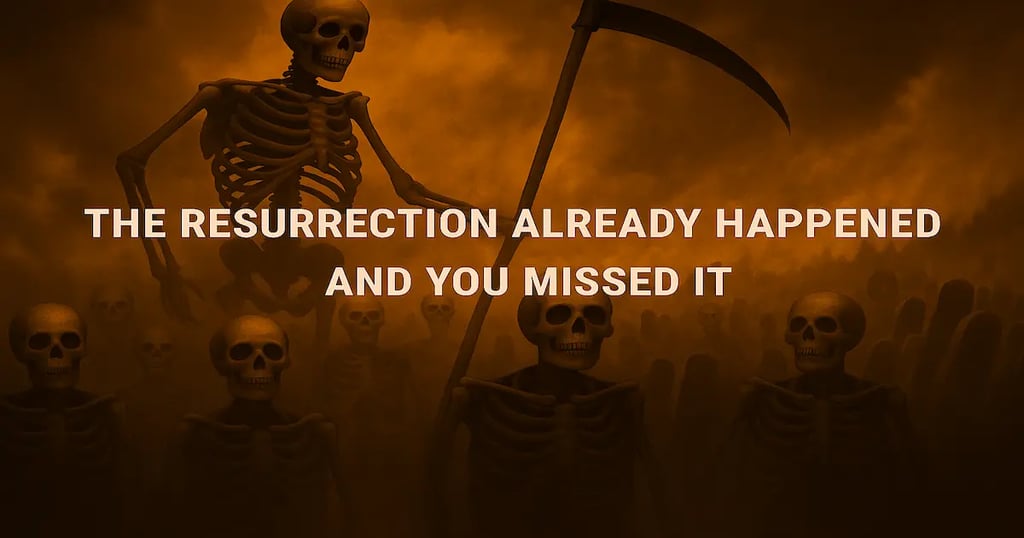Resurrection and Judgment Fulfilled by AD 70
5/14/20253 min read


What the Church Won’t Tell You About Resurrection and Judgment
If the resurrection and judgment didn’t happen when Jesus said they would, then He broke His word. If they’re still in our future, salvation is unfinished. But the Bible and history prove He kept His promise. The resurrection and final judgment were fulfilled in the first century.
The Problem with Futurism
If resurrection and judgment are still waiting to happen, then:
Salvation isn’t complete (Hebrews 9:28).
Death hasn’t been defeated.
And Jesus failed His own timeline.
But He didn’t fail. The New Testament is packed with time statements: “this generation will not pass away,” “some standing here will not die,” “the time is at hand.” Futurism ignores them. Preterism takes them seriously.
1 Corinthians 15: Victory Over the Law, Not Biology
In Corinth, some denied resurrection. Paul answered by tying resurrection to Christ’s victory over the “last enemy, death” (1 Corinthians 15:26). This wasn’t biological death. Paul linked it to sin and the Law (v.56). The Law brought condemnation, and that condemnation was the true death.
When the Temple fell and the Old Covenant ended, the power of that death was broken. The righteous dead were raised out of Sheol into God’s presence, and the living were changed into resurrection life (v.51-52). Paul’s phrase “in Christ shall all be made alive” (v.22) was about covenant identity, not corpses climbing out of graves.
Daniel 12: Resurrection at Israel’s Shattering
Daniel 12:2 describes a resurrection during a time of unparalleled distress. Verse 7 pins it to the moment when “the power of the holy people has been shattered.” That was the destruction of Jerusalem in AD 70.
Daniel’s vision matches Jesus’ words in Matthew 24. The resurrection was covenantal: the faithful received eternal life, the wicked faced shame and contempt. It happened when the Jewish age ended.
John 5 and Revelation 20: Hades Emptied
Jesus said, “All who are in the tombs will hear His voice” (John 5:28-29). Preterists connect this to Revelation 20, where Death and Hades give up the dead.
The “tombs” weren’t physical graves. They were Sheol, the realm of the dead. In AD 70, Hades was emptied. The righteous entered eternal life, the wicked entered judgment. This wasn’t bodies climbing out of graves. It was the unseen world being emptied at Christ’s coming.
2 Timothy 2:17-18 Hymenaeus Jumped the Gun
Paul condemned Hymenaeus for saying the resurrection had already happened. The issue was timing, not nature. It hadn’t occurred yet when Paul wrote, but it would within their lifetime.
And notice this: if resurrection was supposed to mean bodies exploding out of graves, no one could have been fooled. Hymenaeus convinced people because resurrection was covenantal, not biological.
The Final Judgment: Matthew 25 and Revelation 20
The Sheep and Goats (Matthew 25) and the Great White Throne (Revelation 20) describe the same event: covenant judgment. Faithful Israel inherited the Kingdom. Unfaithful Israel faced condemnation. This happened in AD 70 when Jerusalem fell.
Death Destroyed, Salvation Complete
In Scripture, death often means separation from God (Genesis 2:17, Romans 5:12). Jesus came to destroy that death (2 Timothy 1:10). When the Temple fell, the system that reinforced death, the Law, was removed. Revelation 20:14 and 21:4 declare that death was cast into the lake of fire and is no more in the New Covenant age.
Final Verdict
The resurrection and judgment weren’t delayed. They happened in the first century, right on schedule. Christ conquered sin and death, raised the righteous dead, judged the wicked, and secured the New Covenant world.
If resurrection and judgment didn’t happen in that generation, then salvation still hasn’t come. But it has.
